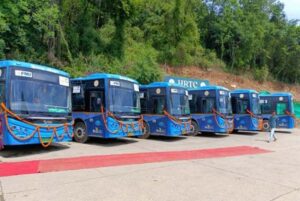The Union Cabinet has recently sanctioned a new bus scheme “PM-eBus Sewa” for augmenting city bus operation by 10,000 e-buses on PPP model.
 The Scheme would have an estimated cost of Rs 57,613 crore, out of which support of Rs 20,000 crore will be provided by the Central government.
The Scheme would have an estimated cost of Rs 57,613 crore, out of which support of Rs 20,000 crore will be provided by the Central government.
The Scheme will support bus operations for 10 years.
The Scheme will cover cities of a population of more than three lakh and above population as per the census 2011 including all the Capital cities of Union Territories, Northeastern Region and Hill States.
Under this scheme priority will be given to cities having no organized bus service. The scheme will generate 45,000 to 55,000 direct jobs through deployment of around 10,000 buses in city bus operations.
The Scheme has two segments:
Segment A – Augmenting the City bus services:(169 cities)
The approved bus scheme will augment city bus operations with 10,000 e-buses on Public Private Partnership (PPP) model.
Associated Infrastructure will provide support for Development/ up-gradation of depot infrastructure; and Creation of behind-the-meter power infrastructure (substation, etc.) for e-buses.
Segment B– Green Urban Mobility Initiatives (GUMI): (181 cities)
The scheme envisages green initiatives like bus priority, infrastructure, multimodal interchange facilities, NCMC-based Automated Fare Collection Systems, Charging infrastructure, etc.
Support for Operation: Under the scheme, States/Cities shall be responsible for running the bus services and making payments to the bus operators. The Central Government will support these bus operations by providing subsidy to the extent specified in the proposed scheme.
Nishant Arya, Vice Chairman and MD, JBM Auto said, “This is a momentous decision that sees e-mobility as a necessity for much of India and especially at a time when the country has committed towards being Net Zero by 2070 and is presiding G-20.”
Aanchal Jain, CEO, PMI Electro Mobility said that the priority given to cities which currently do not have organised buses will enhance the penetration of e-buses in Tier 2, Tier 3 towns of the country, besides solving the problem of a reliable intra-city public transport system.
